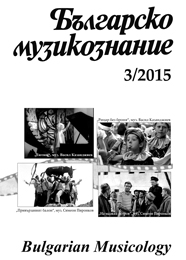Новата музика и българското кино от 60-те и 70-те години. Филмовата музика на Симеон Пиронков и Васил Казанджиев – щрихи в езика на неконформисткия филм
The New Music and Bulgarian film of the 1960s and 1970s. Film music by Simeon Pironkoff and Vassil Kazandjiev: Strokes in the language of nonconformist film
Author(s): Angelina PetrovaSubject(s): Theatre, Dance, Performing Arts, Fine Arts / Performing Arts, Music, Film / Cinema / Cinematography
Published by: Институт за изследване на изкуствата, Българска академия на науките
Keywords: film music; New Music in Bulgaria; nonconformist film; Pironkoff; Vassil Kazandjiev;
Summary/Abstract: The symphonic concept of Bulgarian film music of the second half of the twentieth century is associated with the figures of Philip Koutev, Lubomir Pipkov, etc. The advent of freely atonal, 12-tone and aleatoric-sonorous music to films (mostly by Simeon Pironkoff and Vassil Kazandjiev) breaks off with the stylistics of the ‘officious’ model, being a province of ‘free speech’. Experimenting in musical language became indispensable to the open film dramaturgy looking for new horizons. Thus film music proved to be an essential part of the so-called nonconformist film, represented by such directors as Rangel Vulchanov, Binka Zhelyazkova, Borislav Sharaliev. An ascending trajectory was created of banned and/or ‘dissident film’, distancing themselves from the ‘Socialist Realism’, scored with 12- tone, aleatoric and sonorous music. Simeon Pironkov’s music to Rangel Vulchanov’s On a Small Island and Binka Zhelyazkova’s The Tied Up Balloon was emblematic of that trend. Since the early 1960s through the 1970s, collage established itself in film music, which incorporated the diversity of the actual sounding environment: jazz, pop music, noises, etc. ‘Collage’ musical dramaturgy was brought into being in Simeon Pironkov’s music to The Swimming Pool and The Big Night Bathe and in Vasil Kazandjiev’s music to Knight Without Armour, Thorn Apple, The Master of Boyana and The She-Wolf. In Kazandjiev’s music to some of the films, episodes of sonorous and aleatoric nature are treated as intra- frame music, while other abstracts – in a language as close to that of pop songs as possible – are part of the soundtrack. One of the best feature films with music by Dimiter Griva – Be Blessed – is also of that period. The poetic resistance of composers and directors reveals the non-normativity of dramaturgy and of the music to it; the pressure of the socially dissident position makes itself felt. In parallel, however, in both arts both the filmmakers (great Bulgarian directors) and the composers (creating a context in its own right of the New Music) evince differences in regard to the West-European paradigm. Urge for non-commercial music and distancing from the ideologically imposed pattern are significant in this regard.
Journal: Българско музикознание
- Issue Year: 2015
- Issue No: 3
- Page Range: 41-66
- Page Count: 26
- Language: Bulgarian
- Content File-PDF

